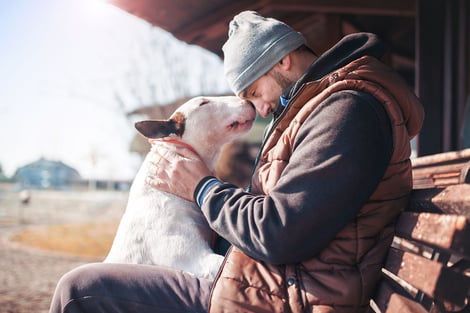
Who do you think of when you hear the phrase “man’s best friend”? Your dog? Your cat?
These buddies are with us through thick and thin, adding joy and laughter — and a whole lot of other benefits — to our lives.
Animals and humans have a two-way relationship that goes deep and improves our lives. As a veterinarian, I take seriously my role of honoring the human-animal bond and sharing the emotional, physical, and psychological benefits of living with pets.
The Human-Animal Bond
The American Veterinary Medical Association (AVMA) defines the human-animal bond as “a mutually beneficial and dynamic relationship between people and animals that is influenced by behaviors essential to the health and wellbeing of both.”
The organization even offers Human-Animal Bond Certification through the Human Animal Bond Research Institute (HABRI). It allows vets to dive into the science behind the human-animal bond, learn more about the benefits of living with pets, and discover new ways of facilitating these important relationships.
The Benefits of Living with Companion Animals
Positive human-animal relationships are good for us in many ways. According to AVMA, these benefits include:
- Reduced anxiety and stress
- Lower blood pressure
- Decreased risk of heart disease
- Allergy prevention for children
- Support for kids with autism
- Assistance for veterans with PTSD and other trauma survivors
- Increased social interaction
- Support for a longer life
We Solemnly Swear…
The human-animal bond is such a priority in my profession that the veterinarian’s oath includes references to championing the human-animal bond.
“Being admitted to the profession of veterinary medicine, I solemnly swear to use my scientific knowledge and skills for the benefit of society through the protection of animal health and welfare, the prevention and relief of animal suffering, the conservation of animal resources, the promotion of public health, and the advancement of medical knowledge.”
The National Institutes of Health (NIH) takes the animal-human bond seriously, too. The agency believes future studies of human health should only be considered comprehensive if the animals that share their lives are included.
What are some of those health benefits?
Positive Brain Chemicals
Scientists have been studying the effects of being a dog owner and found that a number of "positive" neurochemicals are elevated when we are with our dogs.
- Phenylethylamine, which causes elation
- Dopamine, which gives us energy
- Endorphins, the chemicals that give us runner’s high
- Oxytocin, which makes us feel happy
- Prolactin, which causes nurturing feelings
Those chemicals are all elevated in human pet parents — and in dogs! At the same time, cortisol, the stress chemical, goes down.
Improved Heart Health
The American Heart Association tells us that pet ownership improves heart health.
- Dog owners were 65% less likely to die after a heart attack than non–dog owners.
- Dog owners generally had a 24% reduced risk of mortality.
- Owning a cat makes you more likely to be alive one year after a heart attack.
- Non–cat owners had a 40% greater likelihood of death.
Mental Health Benefits
In part because of the brain chemicals we talked about earlier, dogs have been shown to alleviate stress. That’s why we are seeing an increase in animal-assisted interventions, service animals, and emotional support animals. These are all different types of working animals; learn about the differences here.
Animal-assisted interventions have been used to treat depression and post-traumatic stress disorder (PTSD). For an example of a military veteran whose life improved with the help of a service dog, read the story of Robert and Shadow.
Researchers have also found that pets provide a sense of security and comforting routines for people coping with long-term mental health issues.
Aging and Living Longer (and Better) with Pets
Living with a companion animal as you age can help provide emotional support and improve the quality of life for older folks. That’s why more than half of U.S. adults over age 50 have at least one pet. Older people with pets experience less depression, anxiety, stress, and dementia. They also have better physical health, exercise more, and are more likely to maintain a healthy weight.
A number of HABRI studies are looking at the benefits of therapy dogs and fostering cats for improving the mental and emotional health of older adults.
Living with a dog, especially when you don’t live with other people, actually extends your life. A study of more than 3 million dog owners who lived alone in Sweden found they had a 36% chance of living longer than people who didn’t have dogs.
And Don’t Forget the Kiddos
Human Animal Bond Research Institute (HABRI) also studied the impact of pets on children.
When young people grow up with family pets, they experience that feeling of unconditional love. Dogs and cats provide a shoulder to cry on when other humans aren’t there to provide that support. One study showed that children who had pets had a larger range of emotional expression and control. And just like adults, children also have lower stress levels when interacting with dogs.
When kids experience trauma, attachments to pets can promote healthy social development, improve communication, and provide a purpose.
Dogs and guinea pigs in classrooms have also helped children learn to read at their own pace and helped teach empathy.
Taking Better Care of Our Pets — and Ourselves
When people understand the importance of the human-animal bond, they take better care of their companion animals. They take them to the vet more often and are better about following the vets’ recommendations.
When we consider pets to be members of the family, we treat them like they deserve to be treated.
And both humans and animals live happier, healthier lives.

